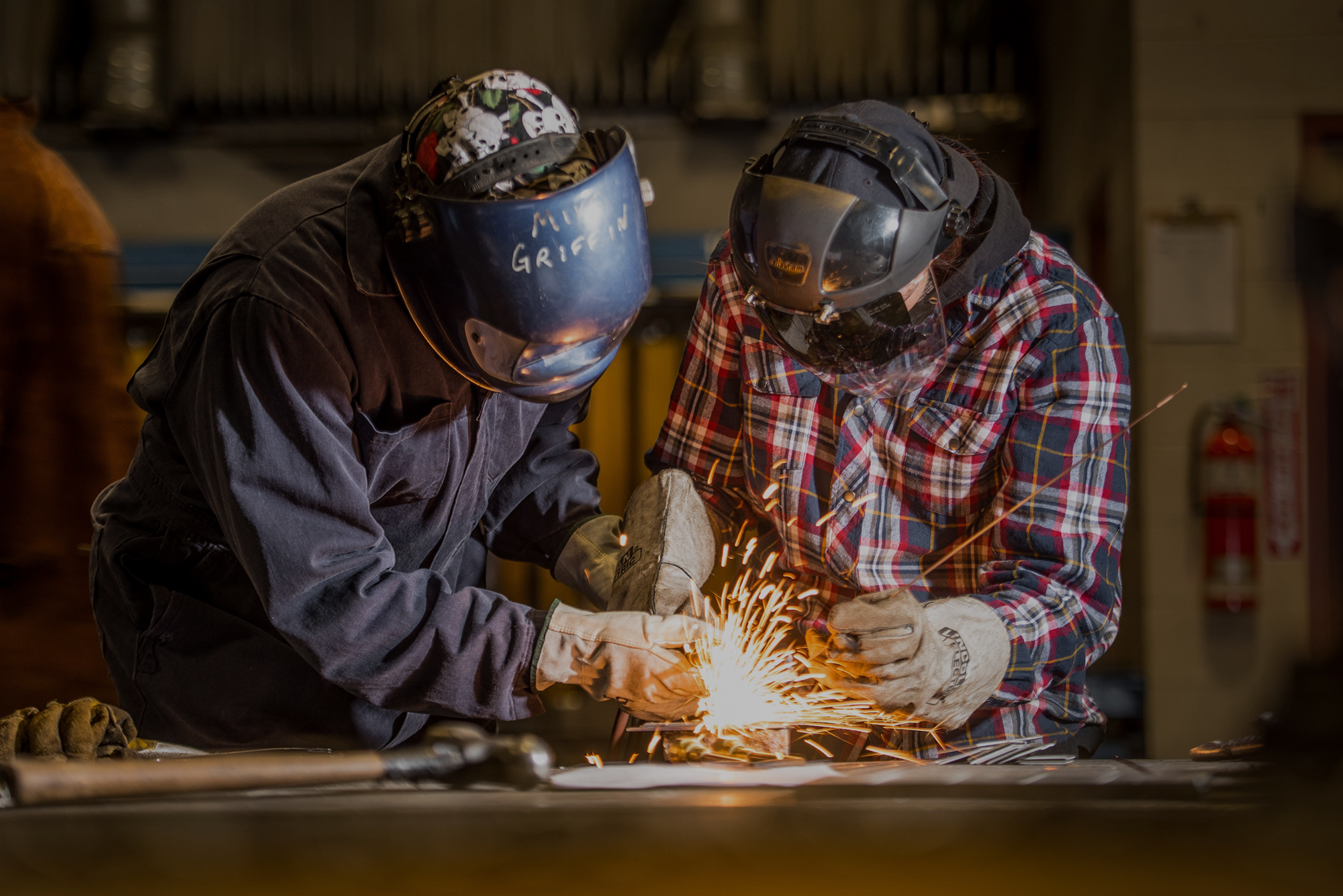See the full January 2019 Education Reporter issue here.
by Karen Hoopes
This article was prepared for Education Reporter by the author. It provides a close look at CareerWise Colorado, a successful bipartisan model of modern youth apprenticeship that has been implemented in that state.
Is there a cure for America’s ailing public education system? An examination of the symptoms reveals that students in schools across America are failing to achieve state minimum academic standards for literacy, numeracy, and science. After decades of education “reforms” such as No Child Left Behind, Race to the Top, and Every Student Succeeds, academic performance continues to fall short. Only 25% of U.S. 12th grade students are proficient at math, 22% are proficient in science, and only 12% are proficient in U.S. History. These are 2017 statistics from the National Assessment of Educational Progress (NAEP), or “The Nation’s Report Card.” (NationsReportCard.gov)
U.S. student dropout rates remain high. One study reveals that while dropout rates have been in decline since 2007, about 800,000 students drop out of school each year — approximately one in every five students. Dropping out exacts a high price for both the student and society. Not only will the individual student fail to reach his full potential and income, depriving society of the fruits of his contributions, but each dropout costs the public $209,100 over a lifetime in reduced tax collections, increased public health and welfare costs. There is also a heightened likelihood of criminal behavior among those who do not receive a high school diploma. (“Educational Attainment of High School Dropouts 8 Years Later,” U.S. Dept. of Education)
For those students who do graduate, studies show they will be arriving unprepared at the doorsteps of college campuses and businesses: unable to think critically and independently, comprehend complex materials, and solve basic problems according to a
national study conducted by Achieve. That 2015 study is titled “Employers and College
Faculty Report Gaps in Recent Graduates’ Preparedness in New National Survey.”
A total of 61% of employers will require that students attain additional education and
training to make up for the educational deficits in reading comprehension, writing, and mathematics. More than 75% of college professors will be dissatisfied with their students’ preparation in critical thinking, comprehension of complicated materials, work and study habits, written communication, and problem solving. This is according to the above-referenced Achieve study.
Apprenticeships as Mitigation
Modern youth apprenticeships are showing promise as a strategy to help students develop critical thinking and problem-solving skills, meet rigorous real world academic standards, provide them with marketable skills in strategic, high growth industries, and to provide work experience, income and college credits free of debt.
The benefits of apprenticeships are numerous. Apprenticeships can provide a second chance at mastering challenging academic concepts and help students learn how to apply theoretical and conceptual information and problem solving in real-life situations.
Many students find that apprenticeships make school more relevant and engaging because they are able to apply what they learn.
According to a national survey of high school dropouts, nearly half said the main reason they left school was because their classes were not interesting. More than 80% said their chances of staying in school would have increased if classes were more interesting and provided more opportunities to develop skills they could use in their careers and in life.
Even students who perform well academically are at risk of dropping out if what they learn in the classroom is not engaging or relevant to their lives. Apprenticeships can help connect students to school by showing them how academic content applies to the real world. The above information was gathered from “The Silent Epidemic: Perspectives of High School Dropouts.”
Apprenticeships can provide at-risk youth with supportive adult relationships. Studies show that students with just one supportive relationship with a caring adult in high school are likely to be healthier, have more economic security, and be more involved in their communities at the end of high school than those who did not have a supportive relationship. Caring adults can help motivate students who may feel isolated, disconnected, and unsuccessful during the regular school day. More details about this can be found in Finding Out What Matters for Youth: Testing Key Links in a Community Action Framework for Youth Development.
CareerWise Colorado Apprenticeships
CareerWise Colorado is a modern youth apprenticeship program that was developed in that state. Loosely based on the Swiss model of apprenticeship, it is business-led and student-centered. Unlike the traditional model of apprenticeship where an assessment is taken and a decision is made to learn a trade or go to college, the Swiss model provides for multiple pathways to success. In Switzerland, 40% of companies participate in apprentice programs and 70% of all students participate in apprentice programs. Not surprisingly, many Swiss CEOs began their careers as apprentices.
When participating in CareerWise, students graduate from high school on time with a nationally recognized industry certification and debt-free college credit. They either enter the workforce immediately after the apprenticeship ends or after higher education. Students graduate with a professional network and valuable experience in a high-paying, high-demand occupation.
Students apply for the program during the spring semester for positions that begin the summer before their junior year of high school. The hiring process is competitive and businesses choose only the students they feel are the best fit. There are no guaranteed or forced placements, and the process is highly competitive. Once hired, apprentices spend part of the week learning at high school and the other part learning on the job at the employer site. They may even begin to take college courses as early as their first year, depending on the goals they have established and their level of readiness. Colorado has defined five primary career pathways for students that correspond to strategic, high-growth industries in the state. These include Advanced Manufacturing, Information Technology, Financial Services, Business Operations, and Healthcare. Job positions in Advanced Manufacturing include Production Technicians, Quality Control Technicians, and Maintenance Technicians. The Information Technology pathway includes positions such as Computer Technicians, Software and Quality Control Testers, and Junior Coders. The Financial Services pathway includes Accounting Clerks, Insurance Services Experts, Financial Coordinators, and Customer Support positions. The Healthcare career pathway includes positions from Certified Nurse Assistants to Licensed Practical Nurses. Business Operations includes Project Coordinators, Purchasing Coordinators, and Operations Specialists. The career pathways, programs, employers, and educational partners will continue to grow as more become engaged.
During the first year, students spend three days a week in high school and 12-16 hours per week on the job at the employer location. Higher education courses are taken when the student demonstrates readiness. In the second year, the student spends two to three days a week in high school and 20-24 hours on the job. In the third year, students spend no time in high school and 32 or more hours on the job.
CareerWise is currently available in four different communities in Colorado, including Denver Metro, Fort Collins, Grand Junction, and Eagle County. These encompass six school districts: Denver Public Schools, Jefferson County, Cherry Creek, Mesa 51, Eagle County, Poudre, and a number of independent schools.
CareerWise is entering its second phase with additional schools, employers, and students signing on.
Modern youth apprenticeships like CareerWise Colorado offer promise in reducing drop-out rates, improving academic performance, and helping students gain industry recognized credentials and work skills in high growth, in-demand industries at higher wages. In an economy with more jobs than people to fill them, it is increasingly important for young people to have the opportunity to obtain the skills they need to be successful prior to graduating from high school. Can Apprenticeships cure what ails education? While apprenticeships are not a panacea, with modern apprenticeship programs like CareerWise, the prognosis is good.
For more information about Career-Wise Colorado and modern youth apprenticeships in Colorado, visit www. CareerWiseColorado.org/. You may also contact your state’s Department of Labor & Employment to learn more about youth and adult apprenticeships and work-based learning opportunities.
 Karen Hoopes works for the Colorado Department of Labor & Employment, Employment and Training Division, Department of Workforce Development. She was elected to the Mapleton Board of Education, Adams County District 1 Colorado in 2011 and served on the Board until 2014, serving as board vice president in 2013. In 2014, she served as a delegate at the Colorado Association of School Board Directors. She was a member of the Mapleton Education Foundation Board from 2011 to 2014, raising funds for scholarships and enrichment activities. In 2014, she was presented the McGuffey Award for service at the Colorado Association for School Board Directors. The Mapleton District pioneered districtwide schools of choice. Note that the views presented in this article reflect the views of Karen Hoopes and do not necessarily reflect the views of the Colorado Department of Labor & Employment or the Mapleton Board of Education.
Karen Hoopes works for the Colorado Department of Labor & Employment, Employment and Training Division, Department of Workforce Development. She was elected to the Mapleton Board of Education, Adams County District 1 Colorado in 2011 and served on the Board until 2014, serving as board vice president in 2013. In 2014, she served as a delegate at the Colorado Association of School Board Directors. She was a member of the Mapleton Education Foundation Board from 2011 to 2014, raising funds for scholarships and enrichment activities. In 2014, she was presented the McGuffey Award for service at the Colorado Association for School Board Directors. The Mapleton District pioneered districtwide schools of choice. Note that the views presented in this article reflect the views of Karen Hoopes and do not necessarily reflect the views of the Colorado Department of Labor & Employment or the Mapleton Board of Education.






